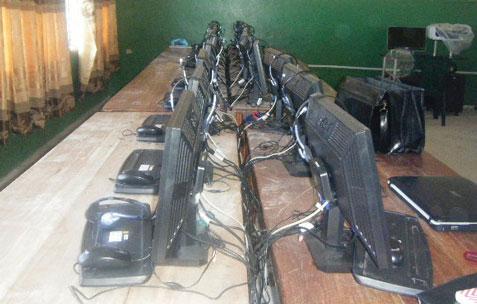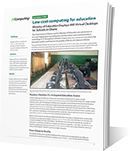CASO DE ÉXITO
Ministry of Education Deploys 800 Virtual Desktops for Schools in Ghana
The Government of Ghana and the Ministry of Education are committed to the rapid deployment and utilization of information and communications technology (ICT) throughout all levels of education as a means to transform the education system and improve the quality of life for all citizens in Ghana.
The government believes that through the deployment of ICT in education, the culture and practice of traditional memory-based learning will be transformed to an improved education system that will stimulate the level of critical thinking and creativity required to meet 21st century challenges.

Each lab consists of 4 new PCs which each host 10 NComputing virtual desktops for 44 simultaneous users.
Replace Obsolete PCs & Expand Education Access
Critical challenges the Ministry of Education has faced in meeting its ICT goals, include underdeveloped physical and institutional infrastructure, lack of electricity and power usage, limited internet access, lack of funding for building new capacities, and limited technical and maintenance support. A recent survey of the Senior High Schools discovered that while most schools had computer labs, they were inadequate and had obsolete and poorly functioning systems. Often there wasn’t any Internet access and availability to educational software was limited at best. Systems were old, sometimes refurbished, and far beyond their useful life. School staff and students struggled just to get these systems working, let alone conduct an actual lesson.
Based on this research, the Ministry determined that the first phase of deployments countrywide should focus on improving reliable computer access. Historically, there had been on average, one computer available for every 42 students. The Ministry set a new goal to double the number of computers so that there would be a computer for every 22 students, a 1:22 ratio. The Ministry also wanted to address the historical inequities of ICT access as there were some situations where as many as 500 students “shared” access to a single computer.
From Vision to Reality
The Ministry of Education assessed traditional thin clients and arranged demos by different manufacturers but found that these solutions were complex, requiring third party hardware components and additional investment for technical support, adding to the overall cost. The NComputing X-series stood out as the most cost effective, with the highest user density per dollar compared to any PC or thin client technology on the market. Using NComputing virtual desktops, the Ministry realized that they could afford to design larger computer labs and deploy them at more schools. In addition, the NComputing systems were compatible with existing applications, reliable, and easy to manage. Expensive IT support and maintenance would not be required to keep them running, which had been a former challenge for the schools.
For their initial deployment, the Ministry of Education turned to IPMC, a leading IT vendor in Ghana, to purchase 800 X-series virtual desktops and 80 host PCs, creating a ratio of 10 additional users to just one host computer. The Ministry selected 20 Senior High Schools to receive the new computer literacy labs. Each computer lab consists of 4 new PCs which each host 10 NComputing virtual desktops for a 44 simultaneous user lab. The new labs are nearly 7 times larger than what some schools had before and provide access to the latest software and teaching tools. The results have been profound as educators and students have discovered new ways to teach, share information and do research.
The NComputing solution works because today’s PCs are so powerful that the vast majority of users only need and use a small fraction of desktop computing capacity. NComputing taps this unused capacity from a single PC or server so that it can be simultaneously shared by many users. Each user’s monitor, keyboard, and mouse are connected to a small and highly reliable NComputing access device, which is then connected to the shared computer. The access device itself has no CPU, memory, or moving parts so it’s rugged, reliable, and easy to deploy and maintain, using only 1-5 watts of electricity. The low electricity usage is critical because as mentioned previously, electricity in Africa can be expensive and often unreliable. Above all, the Ministry’s approval for the use of the NComputing solution is also based on the more affordable unit cost as compared to other competing solutions.
NComputing Delivers Green Computing, & Better User Experience
NComputing has provided the Ministry of Education in Ghana with a solution that addresses its infrastructure challenges, is easy to manage and offers significant savings in operating and capital expenses. In addition, electricity costs have been reduced by 75% as NComputing’s access devices are environmentally friendly and consume only 1-5 watts of electricity. Reducing the amount of electricity that is consumed by the computer lab equipment also reduces the heat and noise, keeping the room cool without the need for additional air conditioning. Most importantly, more students now have the opportunity to use the computer lab to do research, share information, and even investigate opportunities to further their studies.
Into the Future
The successful deployment of NComputing virtual desktops at the Senior High School level has given the Ministry of Education the confidence to devise an implementation plan that will capture the different levels of educational structures in Ghana. By 2016, the Ministry of Education has plans to extend NComputing virtual desktops to over 14,000 Primary Schools (Ages 4-10), 8,000 Junior High Schools (Ages 11-13), and an additional 450 Senior High Schools. The effective use of ICT will help the youth of Ghana to develop the knowledge and talents needed to succeed in an increasingly competitive and digital job market. It will also provide Ghanaian students and teachers an opportunity to exchange ideas and share experiences with their counterparts all over the world.“I think NComputing is brilliant. They are of great help to us. You can play games like Braintastic or Maths Invaders, and write essays and poems,” commented one of the children.
Suggested reading




